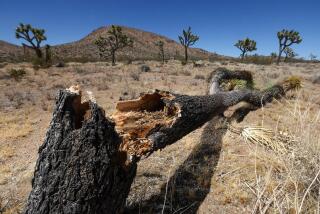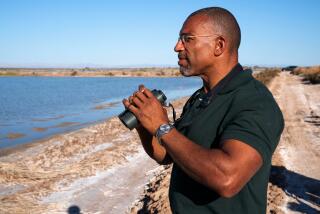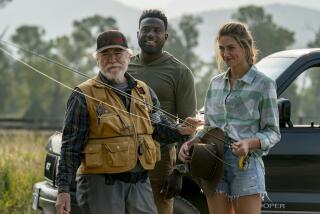Television review: ‘Braving Iraq’
- Share via
“Braving Iraq,” which comes from the PBS series “Nature” and airs Sunday on KCET, is a story mostly of people, water, reeds and birds (but also of frogs, water buffalo and bugs) in which the people, as they are wont to, play both villain and hero. The chief villain is Saddam Hussein, the late Iraqi dictator, who turned to desert 90% of one of the world’s great wetlands, the 6,000-square-mile Mesopotamian Marshes. The representative hero is Azzam Alwash, an Iraqi native who left for the United States in 1978 and returned after the 2003 invasion to help get the water flowing again.
Sometimes identified as the “historical” Garden of Eden, the marshes were a system of reedy waterways twice the size of the Everglades, a permanent home or migratory layover for kingfishers, pelicans, flamingos, cormorants, stilts, teals and warblers. It was home also to the people known as the Marsh Arabs, who lived in ingenious harmony on the water and among the reeds, which provided them with fuel, feed and building material.
That life was ended with the construction of huge embankments along the Tigris and Euphrates rivers and the digging of canals with names like the Mother of Battles and Loyalty to Leader, built to divert water from the marshes and flush it straight out to sea, like a giant metaphor for Hussein’s own misrule. Wetlands had been drained for agriculture and oil before, but his purpose was strictly political: to drive the Marsh Arabs from the land in reprisal for the 1991 Shia uprising. But since 2003 — through individual and coordinated efforts to reflood the plains — the old ecosystem, including its human component, has begun to recover.
As the title indicates, much of “Braving Iraq” is devoted to the challenge of making the film itself. Even in benign conditions, it’s not unusual that the makers of nature documentaries — here the British team of director David Johnson and cinematographer Stephen Foote — become part of the story: These are tales of adventure as well as of biology. Still, says Foote, “it’s not about the bang-bang. It’s about the tweet-tweet,” and the climax toward which the hour builds is, in the best way, for the birds: the sighting of a rare Basran reed-warbler and its nested young, and of wave upon wave of marbled teal, unseen there for 20 years, rising from the reeds as Alwash laughs in delight. “If we can restore this,” he says hopefully, “Iraq can be restored.”
More to Read
The complete guide to home viewing
Get Screen Gab for everything about the TV shows and streaming movies everyone’s talking about.
You may occasionally receive promotional content from the Los Angeles Times.







